ASPET received a record number of applications for the 2016 Fellowship program and all applications were strong, making this the most competitive application process since the program’s inception four years ago. All submissions were carefully considered and the strongest applicants were selected for the program. In addition to their trips to Washington, DC, Washington Fellows receive complimentary registration to attend the ASPET Annual Meeting at EB2016 in San Diego where they will have an opportunity to meet with ASPET leaders and interact with each other.
Brenda Gannon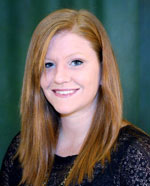
University of Texas Health Science Center, San Antonio
Brenda was born in Arizona. She studied mathematics, chemistry, and spanish at the University of Arkansas at Little Rock. During this time, she also worked in a laboratory at the local water company, where she was exposed to the intersection of science and policy-making. To expand upon this newly-discovered interest, she co-enrolled in the interdisciplinary toxicology and regulatory sciences graduate programs at the University of Arkansas for Medical Sciences. Upon completion of her PhD, she accepted a postdoctoral fellowship in the Department of Pharmacology at the University of Texas Health Science Center in San Antonio. Her research investigates the reinforcing effects of psychostimulant drugs of abuse and how to predict/phenotype specific vulnerabilities to these compounds. Brenda hopes that the ASPET Washington Fellows program will help her learn how to communicate effectively as a scientist with politicians making policy decisions that impact science and hopes this experience will encourage future dialogue between the scientific community and elected officials.
 Lauren Haar
Lauren Haar
Loyola University of Chicago
Lauren was raised in Ohio and earned her bachelor of science in chemistry from George Washington University. She then worked with the J. Craig Venter Institute near Washington, DC and later the Shriners Hospital in Cincinnati, OH under the direction of Cora Ogle, PhD. She was then accepted into the physiology & cell biophysics doctoral program at the University of Cincinnati. Her dissertation work was completed under the direction of W. Keith Jones, PhD, and she is currently working as a postdoctoral research associate in his laboratory at Loyola University of Chicago. Her primary research focus is to understand the gene expression changes that occur with nutritional intervention as a therapeutic for cardiac ischemic injury. The broader goal of this research is to increase the quality of life and the chances of survival for people undergoing myocardial ischemia. Lauren’s career has been shaped by mentorship and support from professors, colleagues, and public institutions. She is passionate about increasing public access to science and science education. By doing so, she hopes to raise awareness about how scientific research positively affects the public good, and to support equal access to scientific resources and opportunities.
 Sara Humphreys
Sara Humphreys
Washington State University
Sara hails from a sheep farm in rural New Zealand. She completed her bachelor’s degree in biochemistry at the University of Otago, followed by a one year master’s in structural biology at the University of Auckland. In 2010, she was awarded a Fulbright Scholarship to attend graduate school in the United States. Sara is currently a PhD candidate at Washington State University. Under the joint supervision of Jeff Jones and James Brozik, she works with the cytochrome P450 enzyme complex. P450s are responsible for metabolizing over 50% of FDA approved drugs. Unfavorable P450-drug interactions lead to toxicity. Sara’s focus is to ‘deconvolute the dance’ between the different components of the P450 machine in time and space at the molecular level. Her research will contribute to a better understanding of how we metabolize drugs, and how we can predict metabolism of drug candidates. As an ASPET Washington Fellow, Sara aims to increase congressional awareness about the dire funding situation in basic biomedical research, and the impact that has on the health of future generations in an increasingly populated world.
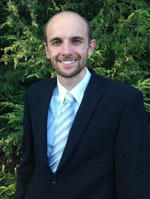 Brandon Lucke-Wold
Brandon Lucke-Wold
West Virginia University
Brandon was born and raised in Colorado Springs, CO. He graduated magna cum laude from Baylor University with a distinction in honors. He is currently completing an MD/PhD program and master’s in clinical and translational science at West Virginia University. Upon graduation, he plans to pursue a neurosurgery residency program. He is in his 3rd year of PhD training and studies neuropharmacologic treatment for concussions. While in the laboratory, he directed a project that found a link between endoplasmic reticulum stress and tauopathy. Tauopathy is seen in football players several years after injury. The laboratory is investigating compounds that target the endoplasmic reticulum stress pathway post-injury. Outside of the laboratory, he is an avid long-distance runner, diabetes education health coach, and frequently volunteers at a local medical clinic for the homeless. As an ASPET Washington Fellow, he wants to advocate for scientific advancement that will help patients.
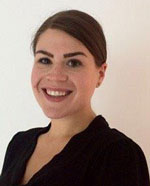 Allyson Marshall
Allyson Marshall
University of Massachusetts School of Medicine
Allyson was raised in New Jersey and received her bachelor’s degree in cell biology and biochemistry from Bucknell University in Lewisburg, PA. She worked as an organic chemistry research student at Bucknell University and traveled to the University of Cadiz, in Cadiz, Spain for a summer research fellowship. She developed an interest in translational research and earned her PhD in integrative physiology and pharmacology from Wake Forest University School of Medicine in 2014. Allyson’s dissertation investigated the long-term physiological consequences of fetal exposure to betamethasone, a drug commonly used to prevent respiratory distress syndrome in premature babies. Her research found changes in the brain renin-angiotensin system in drug-exposed offspring, identifying a potential target for pharmaceutical intervention to correct the effects of betamethasone-induced programming. Currently, Allyson is a postdoctoral fellow at the University of Massachusetts School of Medicine studying dopamine neurotransmission in models of addiction and neurodegenerative disease. As an ASPET Washington Fellow, she is eager to become involved with legislation supporting scientific funding and take a proactive role in communicating the impact of funding biomedical research.
 Amber McBride
Amber McBride
Sandia National Laboratories
A Kansas native, Amber received undergraduate degrees in political science and biology from the University of Kansas and Kansas State University, respectively, and her doctoral degree in nanoscience and microsystems engineering from the University of New Mexico. Her graduate research focused on the development of magnetically targeted aerosol dry powders for the therapeutic treatment of lung cancer. Currently, she is a postdoctoral researcher at Sandia National Laboratories in Albuquerque, NM working on a counter bioterrorism defense project to develop an inhaled treatment strategy against Tularemia francisella. Like many states, funding for basic science at the university level continues to decrease, greatly impacting New Mexico. Amber has been active in science advocacy for New Mexico graduate education and research at the 2015 New Mexico Legislative Session. As an ASPET Fellow, she hopes to affect public policy locally and nationally as an advocate for increased basic research funding.
 Victoria S. Parker
Victoria S. Parker
University of Iowa
Victoria was born in North Carolina and raised in Newport News, VA. She received her BS in chemistry/pre-medicine from Norfolk State University where she was also a recipient of the DNIMAS Full Ride scholarship. She is currently a third-year PhD candidate in the division of medicinal and natural products chemistry at the University of Iowa. Her research focuses on the effects of inhibiting steroid hormone sulfation upon exposure to commonly occurring airborne polychlorinated biphenyls. After obtaining her PhD, she would like to become a medical scientist and work in the industrial field or government. Her passion is to help increase the number of underrepresented students in science, technology, engineering, and mathematics (STEM) through mentoring. Diversity is a powerful component that will bring in multiple ideas from people of diverse backgrounds to achieve a common goal and improve the quality of new drugs and ideas. She believes the ASPET Washington Fellows Program will provide first-hand experience in communicating her scientific ideas and becoming active in public policy in an effort to advocate for increased diversity in decision-making processes, increased funding for biomedical research, and increased awareness about major issues that our communities are facing.
 Naeem Patil
Naeem Patil
Vanderbilt University School of Medicine
Naeem was born and raised in India. He completed his medical school degree from BJ Medical College, Pune, India. Subsequently, he joined the graduate program in pharmacology and toxicology at University of Arkansas for Medical Sciences. Naeem’s graduate work focused on characterizing the renal mitochondrial dysfunction during sepsis. He graduated with a PhD in August 2014 and subsequently joined the laboratory of Edward Sherwood MD, PhD as a postdoctoral fellow at Vanderbilt University Medical Center. Currently, he is working on an immunology project related to alterations in immune responses during sepsis and burn injury and evaluation of immunotherapies for their treatment. Through ASPET’s Washington Fellows program, Naeem wants to learn effective scientific advocacy and public policy skills. He wishes to utilize this newly gained knowledge to convey to other scientists and non-scientists around him the importance of active participation by everyone in influencing the lawmakers to maintain a strong federal research program.
 Natalie Patzlaff
Natalie Patzlaff
University of Wisconsin-Madison
Natalie is a PhD candidate in the molecular and cellular pharmacology program in the School of Medicine and Public Health at the University of Wisconsin-Madison. She studies adult neural stem cells and their regulation by autism-associated RNA binding proteins. In joining the stem cell field, she was struck by the political controversy surrounding the research and the public’s desire for stem cell-based therapies. As scientists, she believes, it is in our best interest to communicate the importance of our work to the public in order to gain their continued support. In addition to advocating for science funding, Natalie is interested in the regulatory aspects of science policy, which can have profound effects on many levels, from our ability to perform research to the approval of new drugs.
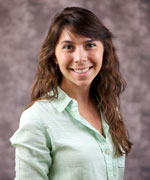 Annie M. Racine
Annie M. Racine
University of Wisconsin-Madison
Annie grew up in Cincinnati, OH and completed her undergraduate degree in philosophy, neuroscience, and psychology at Washington University in St. Louis. She is a fourth year graduate student in the neuroscience and public policy Program at the University of Wisconsin-Madison through which she earned a master of public affairs in the spring of 2015 and is currently working towards completing her PhD in neuroscience. The focus of her research is to characterize neuroimaging and fluid biomarkers of preclinical Alzheimer’s disease (AD) pathology and cognitive decline, with the long-term goal of informing clinical trials for interventions to delay or prevent AD onset. While federal funding for AD research has increased, it is still proportionally underfunded given the magnitude of its impact on individuals, families, and society, illustrating the great need for science advocates. When Annie isn’t at the Wisconsin Alzheimer’s Disease Research Center, she can often be found biking around Madison or in her second lab—her kitchen—experimenting with new recipes.
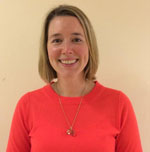 Rebecca Benham Vautour
Rebecca Benham Vautour
Harvard Medical School
Rebecca grew up in Virginia, where her close proximity to Washington, DC exposed her to politics and advocacy from a young age. Rebecca has since moved north, receiving her BA in neuroscience from Hamilton College in Clinton, NY. Her graduate studies brought her to Boston, MA, where she received her PhD in pharmacology and neuroscience from Boston University. Her thesis research focused on the role of BDNF signaling in altering brain inhibitory processes, under the direction of Dr. Shelley Russek. Rebecca is currently a postdoctoral fellow in Dr. Uwe Rudolph’s laboratory at McLean Hospital/Harvard Medical School. Her research examines the role of different GABA-A receptor subtypes in depression and its treatment. Rebecca is excited to be a part of the ASPET Washington Fellows program. She is looking forward to gaining a better understanding of science policy-related issues at the national and local level, and facilitating communication about these issues to fellow scientists, lawmakers, and the general public.